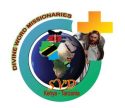Genesis 12:1–4; Psalm 32(33); 2 Timothy 1:8–10; Matthew 17:1–9 Faith, Hope, and Suffering Dear friends, today we are the Second Sunday of Lent. Nearly two weeks of this sacred season have already passed. Before entering into the reflection of today’s readings, it is necessary to pause and examine ourselves with honesty. How have we prayed? … Continue reading Sunday Readings in Brief – Second Sunday of Lent, Year A
Sunday Readings in Brief – 1st Sunday of Lent, Year A
Genesis 2:7–9; 3:1–7; Psalm 50(51); Romans 5:12–19; Matthew 4:1–11 Defeating Temptations Dear friends, today we celebrate the First Sunday of Lent. Lent is a special season of deep reflection on the love of God revealed in the suffering and death of His only begotten Son. These forty days offer us a disciplined opportunity to examine … Continue reading Sunday Readings in Brief – 1st Sunday of Lent, Year A
Ash Wednesday
Joel 2:12–18; Psalm 51; 2 Corinthians 5:20–6:2; Matthew 6:1–6, 16–18 The Meaning of the Lenten Season Dear friends, today we begin the Lenten season, an extraordinary moment for Christians. During the Lenten season, Christians commemorate the passion and death of Jesus Christ, the Saviour of humanity from the slavery of sin and eternal damnation. Ash … Continue reading Ash Wednesday
Sunday Readings in Brief – 6th Sunday in Ordinary Time (Year A)
Ecclesiasticus 15:16–21; Psalm 118(119); 1 Corinthians 2:6–10; Matthew 5:17–37 The Freedom to Choose Dear friends, today we celebrate the 6th Sunday in Ordinary Time. From Wednesday this week, we are going to pause this season to give way to two very intensive seasons: the Lenten and Easter seasons. The Word of God presented to us … Continue reading Sunday Readings in Brief – 6th Sunday in Ordinary Time (Year A)
Jambo KenTan Bulletin 01/26
Bulletin 0126Download

